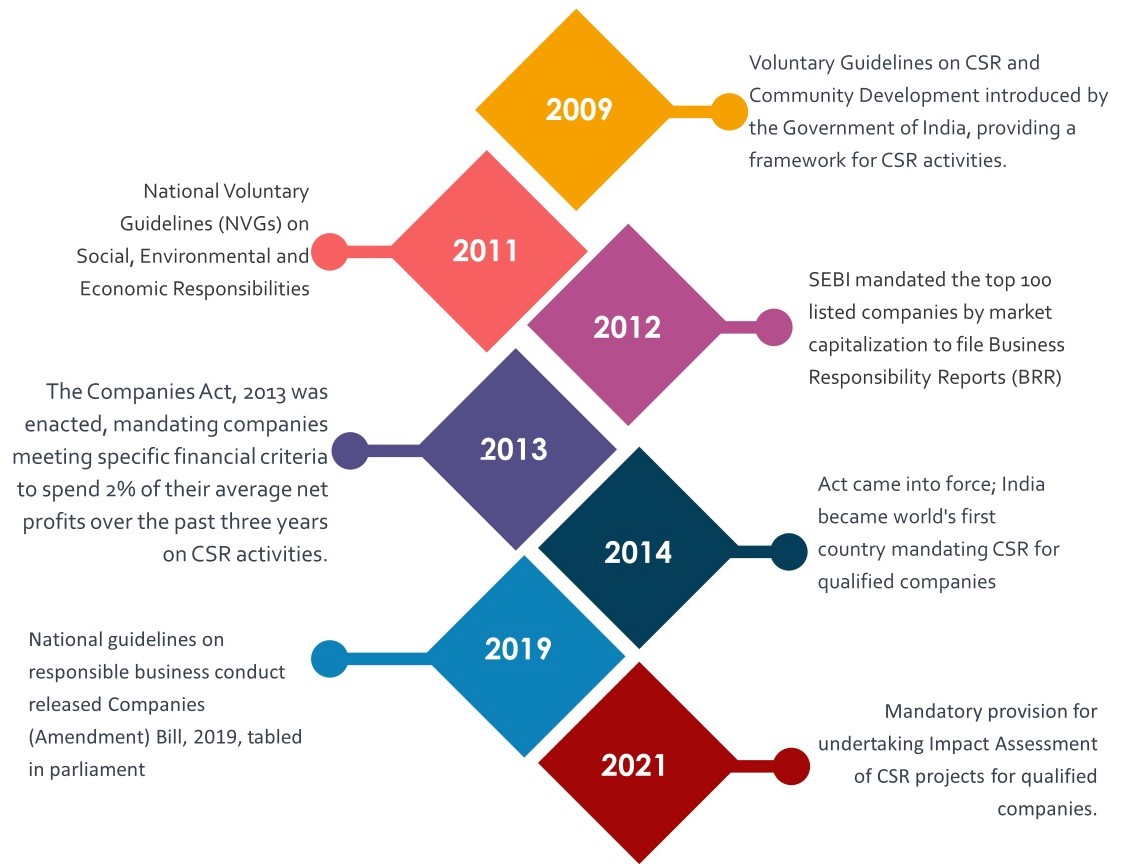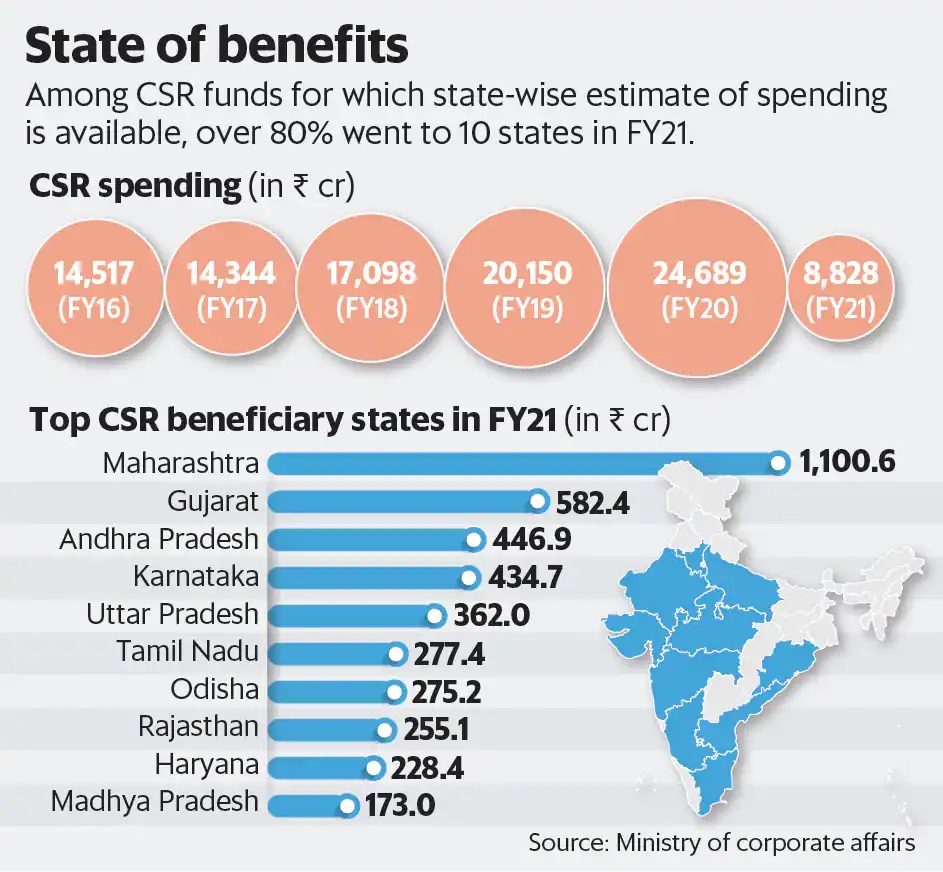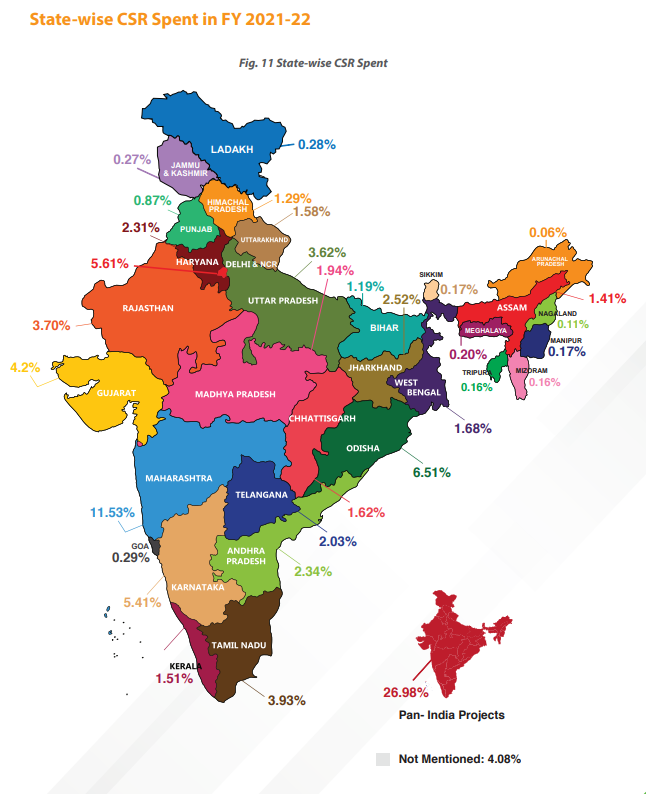

Understanding Corporate Social Responsibility (CSR)
The Evolutionary Journey of CSR
Corporate Social Responsibility (CSR) in India has a rich historical foundation rooted in religious traditions and the philanthropic endeavors of early industrialists. Ancient concepts such as daan, seva, and zakat emphasized the responsibility of the privileged to support the less fortunate. During the freedom movement, corporate leaders actively participated in the fight for independence, forging close relationships with figures like Mahatma Gandhi. Gandhi ji himself proposed the idea of business tycoons as custodians of society’s wealth.CSR is the idea that a company should play a positive role in the community considering Environmental, Social, and Governance (ESG) factors in mind.
In a pioneering move, India became the first country to legally mandate CSR on April 1, 2014. Now, it is mandatory for the companies covered under section 135(1) of the Companies Act, 2013 to spend 2% of their net profit over the preceding three years as per the CSR policy. Section 135 of the Companies Act 2013 provides the threshold limit for applicability of the CSR to a Company having a Net worth of Rs 500 cr. Or more or a Turnover of Rs 1000 cr. or more or a Net profit of Rs 5 cr. or more, during the immediately preceding financial year shall constitute a separate CSR committee.
The committee shall have minimum 3 directors of which one shall be an independent director. However, if the company is an unlisted public company or a private company (not required to appoint an independent director), it shall have two or more directors in its CSR Committee. In the case of a foreign company, the CSR committee shall comprise at least 2 persons of which one shall be a resident of India.
The CSR domain has been changing rapidly, with various laws and amendments coming into play. Following are some of the key milestones that CSR in India has achieved in recent years:

The Contemporary Dynamics of CSR
According to data from the Ministry of Corporate Affairs, Indian companies spent approximately Rs 24,689 crores in FY 2020-21. These funds are allocated across various sectors such as education, healthcare, sanitation, environmental sustainability, rural development, and poverty alleviation, with education and healthcare receiving significant attention.
There is an increasing focus on aligning CSR activities with the 17 United Nations Sustainable Development Goals (SDGs) to ensure that they contribute to broader developmental goals and address critical global challenges.

Mukti’s approach toward CSR
Mukti possesses extensive experience and expertise in working under the activities outlined in Schedule VII of The Act. We place great importance on maintaining transparency and fostering strong relationships with stakeholders, including government authorities, and implementing partners. We strictly adhere to all compliances and prioritize credibility, reputation, and alignment with the company’s CSR goals, mission, vision, and values. With a robust local presence and a deep understanding of legal compliance, we ensure transparency and accountability throughout project planning, implementation, and reporting. Our open-sharing platform provides visibility into all aspects of our work, including financials and impact metrics. These factors have led to significant progress in Mukti’s CSR efforts over the past two years, particularly in terms of funding and establishing the credibility of the organization. The organization has successfully attracted support from various government entities, such as the Small Industries Development Bank of India, State Bank of India, Coal India Limited, and Shyama Prasad Mukherjee Port Trust among others. Additionally, Mukti has formed partnerships with prominent corporations including C.H. Robinson, Flipkart Foundation, Country Harvest, Geo Nutri Foods Pvt Ltd, and Rungta Group, to name a few. These collaborations account for more than 50% of the total donations received by Mukti.
Challenges we are facing in Securing more CSR Funding
CSR activities are conducted across various regions in India, with states like Maharashtra (3306.72 cr), Gujarat (1397.26 cr), Karnataka (1205.23 cr), and Delhi (657.73 cr) attracting a higher proportion of CSR funds due to the presence of corporate headquarters and industries. However, West Bengal has received a lower amount of CSR spend at 427.44 craven less than Delhi (657.73 cr) and Odisha (547.57 cr). It is observed that certain regions experience more active participation and contribution from the corporate sector than others, as reported by the Ministry of Corporate Affairs.
While Mukti has made significant progress in terms of CSR funding, we still lag behind others. A report indicates a geographic bias in funding CSR activities, as companies tend to support projects closer to their base, favoring industrialized areas over underdeveloped regions in need of assistance. We receive numerous requests from corporations to implement programs in affluent areas of Kolkata due to their local presence, but we strive to educate them about the genuine areas in rural West Bengal that require more support.

One specific challenge we face as an organization is the lack of awareness and understanding of CSR among companies and local stakeholders. Many organizations are unaware of the legal requirements and potential benefits of engaging in CSR activities, resulting in lower participation and contribution from the corporate sector in the state.CSR regulations grant companies the freedom to undertake CSR projects directly through their social arm or engage an external implementation partner. In most cases, large corporations tend to establish their own foundations and act as implementing agencies in their respective areas.
According to a survey, companies in the energy and power sector lead in overall CSR spending in India, followed by those in the banking and financial services industry (BFSI), while media and entertainment firms rank lower in terms of CSR expenditure.
On a practical level, Mukti faces a new challenge related to CSR grants, as some companies deduct Tax Deducted at Source (TDS) from the CSR grants, treating it more like a service contract. This deduction not only reduces cash flow for NGOs but also creates complications. Moreover, there have been instances where the Income Tax department considers TDS-deducted income as ‘for profit,’ potentially subjecting it to taxation, although courts have generally rejected such interpretations. Companies are also hesitant to provide administrative costs to NGOs.
Top of Form
Bottom of Form
Conclusion
Spending on corporate social responsibility (CSR) has seen an increase in the most backward districts of the country, it is essential to address the disparities that exist, particularly in regions like West Bengal that are not classified as aspirational districts. The current scenario often favors larger charities, leaving smaller organizations struggling to secure the necessary funding and lacking the resources to fulfill the requirements set by companies.
While CSR has gained recognition and importance in recent times, mandatory regulations can unintentionally affect the quality and overall spending on CSR activities. It is crucial for the government to reconsider policies regarding mandatory trusteeship to ensure that funds are directed towards areas with genuine needs. Additionally, efforts should be made to extend reach and support to the last mile, ensuring that the benefits of CSR initiatives are not limited to metropolitan areas alone. By addressing these challenges and promoting equitable distribution of CSR resources, we can create a more inclusive and impactful CSR ecosystem that truly makes a difference in the lives of those in need. Collaboration between companies, charities, and the government is key to achieving this goal and ensuring that CSR initiatives have a positive and sustainable impact on society as a whole.
Project Activities
- About Mukti (2)
- Accreditation (31)
- AGM (63)
- Agriculture Reforms (16)
- ahm2017 (4)
- ahm2017news (2)
- ahm2017runners (2)
- ahm2018runners (1)
- Ambulance Service (2)
- Amplifying Community Voices (9)
- Awards (22)
- Awareness and Empowerment (13)
- Awareness drives (1)
- Book-Bank (13)
- Careers (8)
- CARR (32)
- Ccp1011 (4)
- Chick Rearing Programme for Marginalised Women (5)
- Climate Resilience River Embankment (1)
- Coaching Center (102)
- Community Clinic (2)
- COVID19 (62)
- Cyclone Amphan Relief and Rehabilitation (129)
- Cyclone Bulbul Relief (30)
- Cyclone Relif (2)
- Cyclone Yaas Relief and Rehabilitation (68)
- Editorial (21)
- Editorial by Abir Biswas (1)
- Editorial by Ankita Kothiyal (1)
- Editorial by Kasturi Bakshi (1)
- Editorial by Prof. Pradeep Ray (1)
- Editorial by Ranitendranath Tagore (1)
- Editorial by Sankar Halder (10)
- Editorial by Satyajit Ray (3)
- Editorial by Sohini Mehta (1)
- Editorial by Soumitra Bose (1)
- Editorial by Subhankar Basu (1)
- Education and Enrichment (34)
- Environment and Resilience (9)
- Essential Items Distribution (19)
- Fair/Exibition (1)
- Featured Activities (10)
- Go Green (81)
- Gram Clinic (2)
- Green (20)
- Health (8)
- Health Water & Sanitation (17)
- Hello Beta (1)
- Impact Stories List (31)
- Integrated Development (11)
- Jal hi Kal (2)
- Kerala Flood Relief (3)
- Kitchen Gardening (2)
- Livelihood & Enablement (20)
- Marathon (13)
- MCDF (14)
- Mcdf (112)
- Mcom (6)
- Medical Camp (8)
- MIT (3)
- MKSS (6)
- MSS (11)
- MUKTI Community Shop (1)
- Mukti Craft (2)
- Mukti Cultural (1)
- Mukti Employment (2)
- Mukti Fresh (2)
- Mukti Gram - Egra (2)
- Mukti Gram - Purbashridharpur (8)
- Mukti Gram, Model Village (136)
- Mukti Green (6)
- MUKTI Institute of Technology (MIT) (3)
- Mukti Kishalaya (2)
- Mukti Support (1)
- Mukto Dhara (1)
- NaRKEL (9)
- Obituaries (4)
- Observance Days Celebration (10)
- Organic Farming (3)
- Organic Farming & Training Support (8)
- Pandemic Support (2)
- Pond Rejuvenation (1)
- Prerana (4)
- Projects For Mukti Wide (3)
- Rights and Special Needs (19)
- Riste (2)
- RTI (14)
- Sahosini (3)
- SAM (9)
- Sam (89)
- SDF (9)
- Skill & Enterprise Development (2)
- Skill Enterprise (2)
- star-of-the-week (9)
- STEP (1)
- Success Stories (39)
- Success Story Coaching Center (1)
- Success Story MCDF (6)
- Success Story RTI (1)
- Success Story SAM (9)
- Success Story TSS (20)
- Sundarbans Green (SUN-G) (1)
- Sunderban development fair project (7)
- Sustainable Agriculture (2)
- SWAS (2)
- SwasthoSongini (4)
- Swavlamban Accelerator in Sundarbans (SWAS) (2)
- Talented (2)
- Tour for Cause (31)
- TSK25 2017 (7)
- TSK25 2017 Runners (7)
- TSS (17)
- TSS (112)
- Uncategorized (59)
- Valued Partners (3)
- Vclpk (1)
- Vetp (2)
- View (2)
- VOICE (2)
- workshop (109)